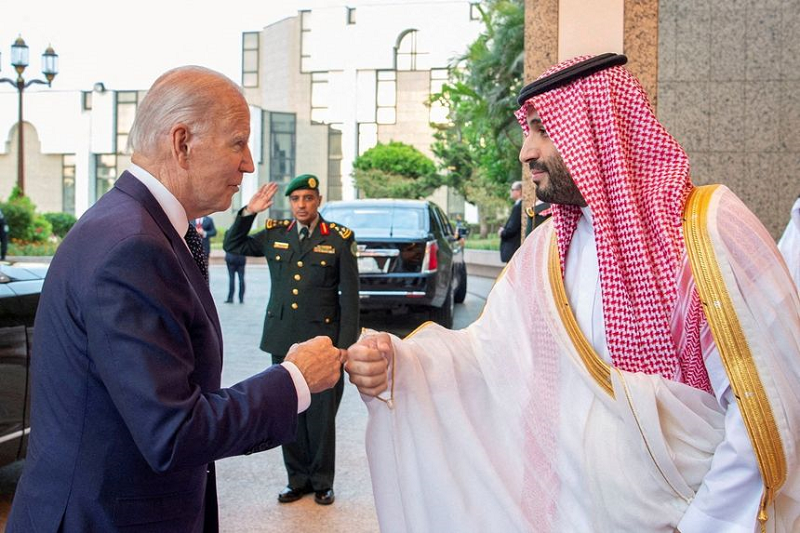THE QUAGMIRE OF CLIMATE CHANGE DIPLOMACY
 An old gospel song attacks the hypocrisy of a certain Mr. Brown, who “prays for Prohibition, but votes for G-I-N.”
An old gospel song attacks the hypocrisy of a certain Mr. Brown, who “prays for Prohibition, but votes for G-I-N.”
That’s not a bad description of the Biden administration’s climate policy. The president took office vowing to make Saudi Arabia a pariah nation and to reduce the world’s dependence on fossil fuels. After a brief fist-bumping détente last summer, he is back on the attack because the Saudis don’t want to produce as much oil as he wants.
Meanwhile, even as it prays for a global energy transition, the administration is scouring the world for new sources of carbon-spewing fossil fuels, relaxing sanctions enforcement against the murdering mullahs in Tehran and looking to steer new revenue into the coffers of the crime lords of Caracas.
Mr. Biden isn’t the only one sending mixed climate messages.
Across the European Union, frantic ministers are reopening coal plants, subsidizing the price of fossil fuels to consumers and otherwise doing everything to heave as much carbon into the atmosphere this winter as they possibly can. Leaders across Europe have adapted St. Augustine’s famous prayer for chastity: Please, Lord, make me green, but not yet.
Energy disruption owing to Vladimir Putin’s war on Ukraine is the immediate cause of the gyrations and flip-flops among climate-focused policy makers, but a larger problem is at work. Integrating climate policy into international diplomacy is hard.
Take Mr. Biden’s frustration with Saudi Arabia. The old U.S.-Saudi partnership was not based only on security. When it came to oil prices, the Saudis were traditionally among the less hawkish members of the Organization of the Petroleum Exporting Countries.
With more than a century of reserves in the ground, the Saudis cared about the long-term health of the oil market. They feared that aggressive pricing would encourage customers to find substitutes for oil and undermine producers in the long run.
The Biden administration’s embrace of a rapid shift from fossil fuels changes calculations in Riyadh. If the oil market is going to dry up by 2050, the Saudis turn into price hawks, wanting the highest possible price for the limited amount of oil they will be able to sell.
And if the American president is leading the charge to kill the world oil market, there is not much reason for the Saudis to help him out of a political jam.
But there is more. World peace is more closely entwined with energy markets than many climate activists understand.
China knows that an attack on Taiwan would result in an immediate halt to energy imports from the Middle East as naval blockades interdicted strategic imports. A net-zero China would be far less dependent on imported energy and would therefore have more ability to pursue a foreign policy that risked military confrontation.
A country that makes solar panels with slave labor may not be motivated by purely philanthropic concerns.
Climate diplomacy is also widening the potentially explosive divide between wealthy nations and the poorer countries of what is often called the Global South, and in ways that green activists will dislike.
Already global climate talks risk deadlock over the cost of the energy transition. The less-industrialized countries of the Global South argue with some reason that they need help to manage the shift and have settled on what some might call the suspiciously large and suspiciously round number of $100 billion a year as their price for cooperation with Western climate plans.
That $100 billion is just a start. The Global South is raising the possibility of “loss and damage” payments. Newly industrializing and developing countries are not responsible for the global warming we experience today, their diplomats say. If climate change is causing floods and droughts across the Global South, shouldn’t the northern countries pay for the damage their past emissions are causing?
American taxpayers are unlikely to sympathize with demands to send an ever-escalating series of payments to foreign “victims of climate change,” especially when much of that money would go to some of the most corrupt countries on earth.
That willingness will diminish further if green activists succeed in raising the price Americans pay for gasoline and electricity to European levels. “More Climate Reparations for East Kleptostan” is not the most inspiring election slogan.
The result is likely to be gridlock at the negotiating table even while concerns over a changing climate rise. As campaigners for noble causes like world peace and nuclear disarmament have discovered, good intentions don’t get you over the goal line.
Even when idealism appears to succeed, as when America’s Frank B. Kellogg and France’s Aristide Briand negotiated their 1928 treaty outlawing war forever, the stubborn realities of international politics intrude.
The Kellogg-Briand Pact is still technically in force but wars rage on. One suspects that climate diplomacy will encounter some crippling disappointments of its own.
Walter Russell Mead is the Ravenel B. Curry III Distinguished Fellow in Strategy and Statesmanship at Hudson Institute and the James Clarke Chace Professor of Foreign Affairs and Humanities at Bard College in New York.

